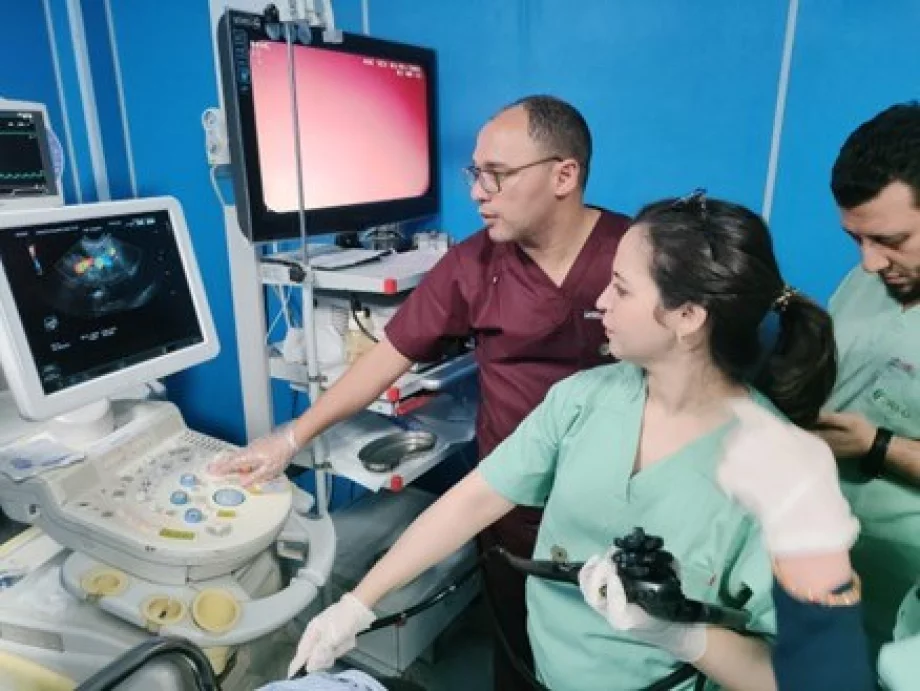I am presenting this detailed report to share my enriching experience during the endoscopic ultrasound (EUS) training organized by the esteemed WEO International School of EUS (WISE) for its 2024 Egyptian Chapter. I also want to take this opportunity to extend my sincere thanks to all the professors and experts whose contributions made this experience both memorable and educational.
I wish to express my deep gratitude for the exceptional opportunity I had to participate in the EUS training of the WISE 2024 Egyptian Chapter 2024. I consider myself privileged to have benefited from such an enriching program, and I want to convey my sincere appreciation for the WISE program. The quality of the training and its structured approach significantly enhanced my skills and knowledge in this specialized field. Every moment of this training was invaluable, and I am profoundly grateful for this unique opportunity.
A particularly remarkable aspect of this training experience was the emphasis on essential human qualities in medical practice, including repetition, teamwork, and the complementarity of information among the various supervising experts. This human dimension deeply touched all the participants, highlighting the importance of these aspects in medical education and daily practice. The generosity of each contributor, represented by Professor Elsayed Ghoneem from Mansoura University, whose kindness guided each of us, the exemplary dedication of Professor Khaled Ragab from the Theodor Bilharz Research Institute, the patience and commitment of Professor Moaz Elshair from Al Azhar University, and the wisdom and expertise of Professor Hussein Okasha from Cairo, served as sources of inspiration for us all. The sharing of high-level information, combined with the moving testimonies of the candidates, created a unique learning environment characterized by respect, gratitude, and humility.
We sincerely thank Professor Dong Wan Seo, President of WISE, for his pivotal role in enabling this remarkable opportunity. His vision and dedication to medical education have been instrumental in providing access to valuable training, especially in EUS. Through his leadership, this program has the potential to transform medical practices globally, fostering professional growth for candidates worldwide. We are deeply grateful for his inspiring leadership and commitment to advancing medicine.
Endoscopic ultrasound training
Participation in the practical training in EUS in Egypt was a pivotal experience for my professional development. Under the guidance of WEO, I had the opportunity to acquire essential skills and knowledge that enriched my medical practice. In this presentation, I will detail the various aspects of the training, highlighting the valuable lessons I received and the future prospects I envision.
Training progress
Lectures and theoretical foundations: The module of lectures, every morning or between hands-on sessions, was essential for laying the theoretical foundations of EUS. Topics ranging from an introduction to EUS to relevant anatomy were covered comprehensively. The theoretical lectures were complemented by interactive clinical cases and visual aids such as videos and explanatory diagrams, facilitating the understanding of complex concepts.
Hands-on experience: The hands-on practical sessions were a crucial component of the training, offering participants the opportunity to apply the theoretical knowledge gained in a simulated clinical environment. The division into groups and the close supervision of the professors fostered an interactive and personalized learning experience. Additionally, hands-on sessions in appropriate hospital environments allowed participants to familiarize themselves with the real-life conditions of EUS practice.
Workshops on accessories and endoscope positioning: The workshops dedicated to explaining accessories and endoscope positioning complemented the hands-on practical sessions by providing detailed demonstrations and practical advice. These workshops allowed participants to develop a thorough understanding of the tools used in EUS and of endoscope manipulation techniques.
Candidate evaluation: The structured questionnaire used for candidate evaluation showcased significant progress, indicating the effectiveness of the program. I am eager to continue my professional development in this field and look forward to future opportunities for growth.
In conclusion, this practical EUS training in Egypt was an extremely enriching and instructive experience. It deepened my theoretical knowledge and practical skills in this specialized field of medicine. I would like to express my sincere gratitude to the entire teaching team for their dedication and expertise, as well as to WEO for making this opportunity possible.
This enriching experience has inspired me to actively pursue my professional development in the field of EUS. I am driven by the desire to continue deepening my knowledge and honing my skills, putting into practice the lessons learned during this training. I am determined to stay at the forefront of advances in this constantly evolving field, and I am open to opportunities for continuous training and professional development. I am confident that the knowledge gained during this training will have a significant impact on my future medical practice, and I am grateful for this experience that has broadened my professional horizons.
Thank you once again for this opportunity.
Sincerely,
Dr. Fatima Belabbes
Assistant Professor
Gastroenterology and Hepatology, Faculty of Medicine, Mohammed VI University of Health and Sciences (UM6SS) Casablanca, Morocco.
